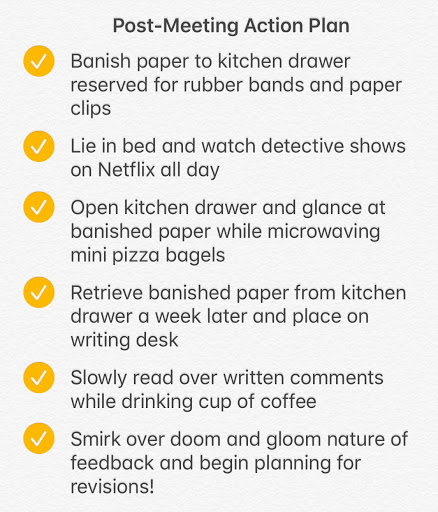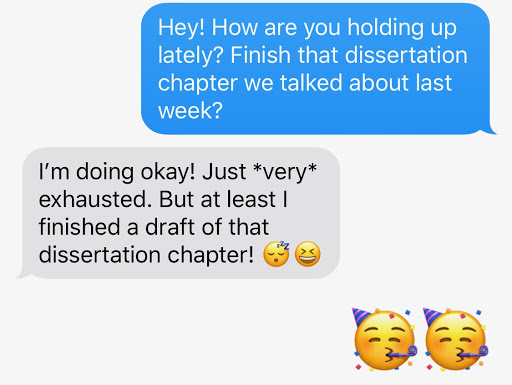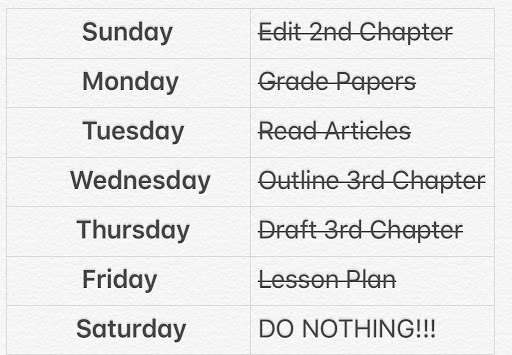Fear of Criticism and Failure
By a Graduate Student
Once upon a time, I had to defend the “prospectus” or plan for my dissertation to my committee members. I spent many months researching, drafting, and revising my prospectus. I focused on making my ideas clear. I memorized the main points of my argument. When my prospectus defense began, I shared with excitement everything I had learned and planned to do. And the first question a committee member asked me in response was: “So… what’s your dissertation about?”
My stomach sank. For the next ninety minutes, I had to endure severe comment after severe comment on how undeveloped and—to my ears—stupid my ideas were. It did not feel like they were just objectively addressing my “writing.” It felt like they were personally addressing me (as a writer).
Receiving such harsh criticism not only made me feel like a failure, it also made me afraid to write later on in fear of receiving more harsh criticism and failing again. How did I deal with (and continue to deal with) the sometimes hurtful realities of academic writing? Not by making my research and writing any less personal to me but by keeping in mind a few mottos that have greatly informed my approach to academia, in general, and academic writing, in particular :
1. “Wisdom lies in taking everything with good humor and a grain of salt.” — George Santayana

After my prospectus defense, I did not want to look at or even think about anything I had written. I put my dissertation completely out of my mind for a few days—which was the most helpful and useful action I could have taken. When I eventually returned to my dissertation, I discovered that I could think about all the criticism I had received more rationally and less emotionally. I had a clear-eyed perspective on my committee members’ comments about the shortcomings in my work. I recognized that my committee members were experts on the subjects that I wanted to study and could see some of the faults in my ideas that they were bringing to light. And even if there were certain comments that I still did not agree with, I could accept that—for the most part—their criticisms about my ideas were based upon their own past experiences as early-career scholars who received (possibly harsh) criticism from their committee members.
And more than being able to develop a strategy for revising my dissertation, I could look back at my prospectus meeting with a sense of irony. Yes, my research is meaningful to me. Yes, my writing is deeply personal to me. But the idea of a group of people huddled together in a small room discussing the intricacies of academic scholarship was nothing if not humorous to me. I learned that even though sticks and stones and words could definitely hurt me, I could now look back at that (painful) memory with a smirk instead of a frown. I could think about the criticism I received with good humor and a grain of salt.
2. “Friendship is unnecessary, like philosophy, like art…It has no survival value; rather it is one of those things which give value to survival.” — C. S. Lewis

I have found as a graduate student that the difference between a “friend” and a “colleague” can make the difference between succumbing to or surviving the sometimes brutal realities of academia and academic writing. Simply having a friend in my program who I could talk with about the difficulties I faced in my prospectus defense—and any other aspects of our graduate degree program—was more valuable to me than hypothetically receiving advice and guidance from the most prestigious scholar imaginable. When I talk to people in my program who I consider to be both colleagues and friends, we discuss more than just our ideas and writing. We also share with each other about the personal realities of being a graduate student! Whether talking in-person at a coffee shop or texting late at night while editing a dissertation chapter, the conversations I’ve had with fellow travelers in my program have been invaluable to my survival as a graduate student.
3. “It is easy for us to lose ourselves in details in endeavoring to grasp and comprehend the real condition of a mass of human beings. We often forget that each unit in the mass is a throbbing human soul.” — W. E. B. Du Bois

From my many different experiences as an undergraduate student, high school teacher, graduate student, and graduate instructor, here’s the most important lesson I’ve learned: the well-being of myself and my students come before any academic assignment, project, or degree. I want to succeed as a graduate student—for more than just the prospect of a good job or financial security. I want to succeed in my graduate program because I believe in the ideas that I research and write about. But I’ve learned that simple decisions such as taking off a weekend in order to spend time with family and friends are key for me to maintain a healthy mental and emotional state. I no longer think that spending a Saturday away from my books and laptop makes me a “bad” student. For even if the world of academia still contains for me infinite possibilities for exploring who we are and how our society came to be, I believe first and foremost that I am a human soul whose worth could never be measured by any dissertation or degree.
This blog showcases the perspectives of UNC Chapel Hill community members learning and writing online. If you want to talk to a Writing and Learning Center coach about implementing strategies described in the blog, make an appointment with a writing coach or an academic coach today. Have an idea for a blog post about how you are learning and writing remotely? Contact us here.

